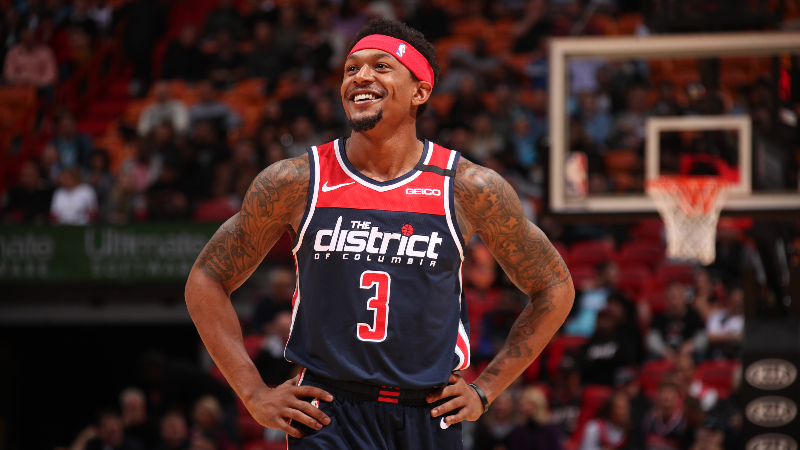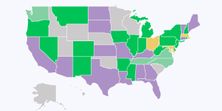Unfair Odds Highlight Major Issues With Newly-Launched Washington D.C. Sports Betting
Issac Baldizon/NBAE via Getty Images. Pictured: Bradley Beal #3 of the Washington Wizards.
If you live in Washington D.C., it is now (finally) legal to bet on sports online. The District launched its GambetDC platform Thursday, which is powered by the D.C. lottery.
It is the only place to legally bet online within D.C. district lines (arenas and sports bars can offer betting as well, though just in those locations), providing a contrast to other close states like New Jersey and Pennsylvania, which both have a variety of platforms like DraftKings, FanDuel, PointsBet, BetMGM and others.
That gives customers choice and competition among sportsbooks. That's not what you'll get in D.C., and bettors will be much worse off for it.
The thing that will stand out right away to seasoned bettors is the odds for a variety of markets. Using Week 1 NFL odds as an example, GambetDC is offering odds of -118 both ways on the spread for the Washington Redskins vs. Philadelphia Eagles game.
That gives a hold — the margin that sportsbooks take on both sides of the game — of 7.63%. For reference, the standard is -110 on both sides of a spread bet, which gives a hold percentage of 4.55%. The NJ and PA books listed above are all at that mark for Week 1 NFL, and last year PointsBet, for example, gave -105 odds on both sides for a hold percentage of just 2.38%.
| Platform | Odds | Hold Percentage |
|---|---|---|
| GambetDC | -118 | 7.63% |
| Sports Bet Montana | -118 | 7.63% |
| DraftKings | -110 | 4.55% |
| FanDuel | -110 | 4.55% |
| PointsBet | -110 | 4.55% |
| BetMGM | -110 | 4.55% |
And it's not just NFL spreads. Take a look at the moneylines for UFC's big upcoming fight between Tyron Woodley and Gilbert Burns.
| Platform | Woodley/Burns | Hold Percentage |
|---|---|---|
| GambetDC | -200/+155 | 5.56% |
| Sports Bet Montana | -200/+155 | 5.56% |
| DraftKings | -182/+150 | 4.34% |
| FanDuel | -184/+156 | 3.71% |
| PointsBet | -190/+150 | 5.23% |
| BetMGM | -176/+145 | 4.38% |
That's a hold percentage of 5.56% at GambetDC, which is much higher than other sportsbooks offered in different states. FanDuel, for reference, has a hold percentage of 3.71% given their odds of -184/+156.
The bigger picture here is the difference between states in how they've chosen to legalize and regulate sports betting since the fall of PASPA in 2018. New Jersey and Pennsylvania have been an incredibly successful archetype, offering fully online betting — you can bet, deposit and withdraw without ever entering a casino or retail sportsbook — and a variety of operators, giving people choice and importantly competition.
Some states haven't figured out the online betting portion of it yet (although that could change in the age of COVID-19), but the worst is the lottery-run monopolies of Washington D.C. and Montana.
The two main issues at play are 1) the lotteries of the states and 2) the monopolies of the states. The former is an issue solely because lotteries have not proven skilled at regulating the sports betting industry, whereas casino-based ventures — like what's being discussed in Ohio — have more experience.
But the supposed monopolies are a problem here as well. The fundamental flaw of D.C. and Montana is that they believe, as the only online, state-wide sportsbook operator available, that they have no competition when in reality they are the industry disruptors.
It would be a different story if gambling hadn't been around for decades in the U.S., but that's not the case. It has existed in the shadows at illegal offshore sportsbooks — and the idea of legalized sports betting in the U.S. is to monetize it and get taxes, sure, but it's also to regulate it and provide protections for gamblers not afforded at offshore companies.
But gambling is not just a U.S. industry in the age of the internet — it's a worldwide one. And for all hopes and dreams of taxes and protections, there's no such thing as a monopoly in a state. All it does is disincentivize users from betting legally, thus defeating the purpose of legalizing in the first place.
Perhaps the difference between -110 and -118 odds doesn't matter to new, casual bettors — especially ones who don't even know about offshore books. And maybe D.C. residents will opt to travel to Capital One Arena — which will host a William Hill sportsbook — or sports bars every time they want to make a bet. But that's a risky gamble that doesn't have to be made, especially with bordering Virginia potentially entering the market with mobile betting by year's end.
Washington D.C., welcome to the legalized sports betting world. Other states, don't copy them.
More Sports Betting Industry News & Content
- $21.8 Billion in Bets: Where the Sports Betting World Stands 2 Years After Overturn of PASPA
- The Best Online Sportsbooks, Promo Codes & Reviews
- Where Is Sports Betting Legal? Projections for All 50 States
- When Will Soccer, MLB, Golf, NFL, NBA & More Come Back? Updated Return Dates for Every Sport
- Following Earnings Call, DraftKings Stock Price Continues to Rise Despite COVID-19 Uncertainty
How would you rate this article?

